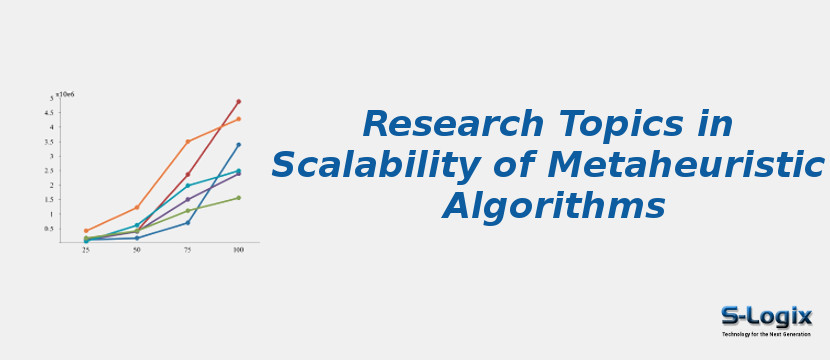Metaheuristic algorithms are designed to be scalable, meaning they can handle problems of increasing size and complexity. However, their scalability depends on the specific algorithm and its applied problem. Some metaheuristics, such as genetic algorithms, can be highly scalable due to their parallel nature, whereas others, such as simulated annealing, may be less scalable due to their sequential search process. Various techniques can be used to increase the scalability of a metaheuristic algorithm, such as parallelization, distributed computing, and problem decomposition. However, it is important to note that scalability also depends on the efficiency of the algorithm-s search process, which can be affected by factors such as the quality of the solution representation and the choice of stopping criteria.
There are several challenges in the scalability of metaheuristic algorithms, including:
• Time Complexity: The efficiency of the algorithm may decrease as the problem size increases, making it difficult to scale up to larger problems.
• Memory Requirements: Metaheuristics often require large amounts of memory to store candidate solutions, which can limit scalability.
• Parallelism: Parallelizing the algorithm to run on multiple processors or nodes can be challenging, as it requires careful consideration of communication overhead, load balancing, and data dependencies.
• Solution Quality: The quality of solutions produced by the algorithm may degrade as the problem size increases, making it difficult to maintain acceptable performance levels.
• Difficulty in Problem Decomposition: Some problems cannot be easily decomposed into smaller subproblems, making it difficult to scale up the algorithm to handle larger problem sizes.
Despite these challenges, various techniques can be used to address them and improve the scalability of metaheuristic algorithms. These include using more efficient data structures, adjusting the parameters of the algorithm, and combining multiple metaheuristics to form hybrid approaches.
• Large-Scale Optimization Problems: Metaheuristics can be applied to large-scale optimization problems, such as those encountered in supply chain management, logistics, and finance.
• Multicore and Distributed Systems: Scalable metaheuristics can be applied to optimize the performance of multicore and distributed systems, such as those used in high-performance computing and big data analytics.
• Logistics and Transportation: Metaheuristics can be used to optimize logistics and transportation problems, such as vehicle routing and scheduling, to improve efficiency and reduce costs.
• Financial Planning: Scalable metaheuristics can be applied to financial planning problems, such as portfolio optimization and risk management, to improve decision-making and investment outcomes.
• Resource Allocation: Scalable metaheuristics can be used to optimize the allocation of resources in cloud computing environments, including virtual machines, storage, and network resources.
• Manufacturing and Supply Chain: Metaheuristics can be used to optimize the planning and scheduling of manufacturing and supply chain processes, to improve efficiency and reduce costs.
• Medical Applications: Scalable metaheuristics can be used to optimize treatment plans and resource allocation in medical applications, such as radiation therapy and surgery planning.
There are several future research directions in the scalability of metaheuristic algorithms, including:
• Distributed Metaheuristics: Developing efficient and effective methods for parallelizing metaheuristic algorithms across multiple processors or nodes.
• Hybrid Metaheuristics: Combining multiple metaheuristics to form hybrid approaches that improve solution quality and scalability.
• Scalable Problem Representations: Developing representations more suitable for metaheuristic algorithms, in terms of scalability and solution quality.
• Machine Learning-based Metaheuristics: Integrating machine learning techniques into metaheuristics to improve their ability to scale to larger problems.
• Adaptive Algorithms: Develop metaheuristics that can adapt to the problem-s characteristics to improve scalability and efficiency.
• Scalability in Dynamic and Uncertain Environments: Developing metaheuristics that can handle problems with dynamic and uncertain constraints, such as in real-time applications. These research directions aim to address the challenges in the scalability of metaheuristic algorithms and improve their ability to solve large-scale optimization problems.
• Big Data Optimization: Developing metaheuristics that can handle large-scale optimization problems arising in big data.
Some of the trending research topics in the scalability of metaheuristic algorithms include:
• Parallel Metaheuristics: Developing parallel implementations of metaheuristics algorithms to improve scalability and speed up optimization processes.
• Distributed Metaheuristics: Researching the design and implementation of distributed metaheuristics algorithms to handle large-scale optimization problems in a scalable and efficient manner.
• Scalable Metaheuristics for Big Data: Researching the development of scalable metaheuristics algorithms for big data applications, such as data clustering and classification.
• Metaheuristics for Resource Allocation: Investigating the design and implementation of metaheuristics algorithms for resource allocation in cloud computing environments, including virtual machines, storage, and network resources.
• Scalable Metaheuristics for Logistics and Transportation: Researching the development of scalable metaheuristics algorithms for logistics and transportation problems, such as vehicle routing and scheduling.
• Hybrid Metaheuristics: Investigating the development of hybrid algorithms that combine classical optimization techniques with metaheuristics to improve scalability and performance.
• Adaptive Metaheuristics: Studying the design and implementation of adaptive metaheuristics algorithms that can automatically adjust to changing optimization problems and conditions.
• Comparison of Scalability of Metaheuristics: Comparing the scalability of different algorithms and investigating factors that affect scalability, such as problem size, algorithm complexity, and hardware resources.
